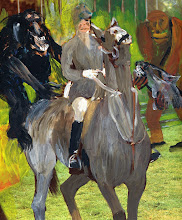The waiters’ game of cards in a back room in yellow light on a cold quiet night in late winter. An ordinary night scene without fireworks or stars.
One player arrived smoking as we turned the corner. The room belongs to a black man. They will wake up at midday. The host will prepare breakfast for the losers. You can see his profile, another’s face and some hands.
P.S. There is no waiters’ game now, no waiters, no hotel where the waiters work. The room is slowly dying with the rest of the corner building. The waiters have flown south forever.
Omens of Resignation
A sort of omen – I looked for the meaning of Goethe’s concept of “Entsagung” (resignation, renunciation) and read in a “suppressed maxime” of de La Rochefoucauld that “One need not be astonished that self-love sometimes unites with the strictest renunciation.” Then I noticed in his chronology, that he is the co-author of a novel remarkable for its “morality of renunciation” – “La Princesse de Clèves”. In the novel the heroine renounces marriage with her lover, out of obedience to the wishes of an unloved dead husband. Was de La Rochefoucauld’s ‘Faustian’ dialectic of self-love (l’amour-propre) one of the sources of Goethe’s peculiar concept of renunciation? Self-love according to de La Rochefoucauld can even form alliances with its own enemies and work towards its own ruin. But if self-love ruins itself in a certain place through renunciation – it is only because at the same time somewhere else it has already re-established itself.
Madame de La Fayette, the presumed author of “La Princesse de Clèves”, and her close friend de la Rochefoucauld were under the austere influence of Jansenists.
The key omen was that de La Rochefoucauld died on March 17th 1680 and on another March 17th I felt the urge to re-read some of his maximes – especially about the myth of the contempt for death – “de la fausseté du mépris de la mort”.
P.S. La Princesse de Clèves reincarnates as the “Marschallin”, Princess Marie Thérèse von Werdenberg in Hofmannsthal’s “Der Rosenkavalier”. The Marschallin resigns herself to losing her young lover, helping him towards matrimonial bliss with the lovely daughter of the “parvenu”.
The drama of “Entsagung” turns into a bittersweet farce in the style of the old Viennese theatre.
One player arrived smoking as we turned the corner. The room belongs to a black man. They will wake up at midday. The host will prepare breakfast for the losers. You can see his profile, another’s face and some hands.
P.S. There is no waiters’ game now, no waiters, no hotel where the waiters work. The room is slowly dying with the rest of the corner building. The waiters have flown south forever.
Omens of Resignation
A sort of omen – I looked for the meaning of Goethe’s concept of “Entsagung” (resignation, renunciation) and read in a “suppressed maxime” of de La Rochefoucauld that “One need not be astonished that self-love sometimes unites with the strictest renunciation.” Then I noticed in his chronology, that he is the co-author of a novel remarkable for its “morality of renunciation” – “La Princesse de Clèves”. In the novel the heroine renounces marriage with her lover, out of obedience to the wishes of an unloved dead husband. Was de La Rochefoucauld’s ‘Faustian’ dialectic of self-love (l’amour-propre) one of the sources of Goethe’s peculiar concept of renunciation? Self-love according to de La Rochefoucauld can even form alliances with its own enemies and work towards its own ruin. But if self-love ruins itself in a certain place through renunciation – it is only because at the same time somewhere else it has already re-established itself.
Madame de La Fayette, the presumed author of “La Princesse de Clèves”, and her close friend de la Rochefoucauld were under the austere influence of Jansenists.
The key omen was that de La Rochefoucauld died on March 17th 1680 and on another March 17th I felt the urge to re-read some of his maximes – especially about the myth of the contempt for death – “de la fausseté du mépris de la mort”.
P.S. La Princesse de Clèves reincarnates as the “Marschallin”, Princess Marie Thérèse von Werdenberg in Hofmannsthal’s “Der Rosenkavalier”. The Marschallin resigns herself to losing her young lover, helping him towards matrimonial bliss with the lovely daughter of the “parvenu”.
The drama of “Entsagung” turns into a bittersweet farce in the style of the old Viennese theatre.

















.jpg)














No comments:
Post a Comment